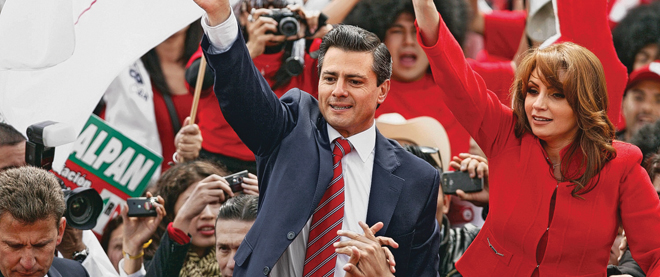A president-in-waiting?
Media darling Enrique Peña Nieto leads the pack in the run-up to the 2012 vote—despite some stumbles
Alex Cruz/EPA/Keystone Press Agency
Share

Mexican politicians deliver annual reports known as informes, serving up pomp, pageantry and political theatre. Informes glorify accomplishments and gloss over failures, perhaps making it no surprise that recently departed state of Mexico governor Enrique Peña Nieto—the early front-runner for the 2012 presidential contest—served up some unbelievable crime numbers this fall. Peña Nieto bragged of achieving a 54 per cent reduction in the murder rate between 2005 and 2010—and friendly media outlets trumpeted the claim. “Peña Nieto lowers homicides 50 per cent,” screamed the tabloid La Razón. It took The Economist magazine, however, to take Peña Nieto to task, calling his figures “absolutely false” because a statistical revision in 2007 caused the homicide rate to tumble, and forcing the presidential contender to subsequently issue a rare mea culpa.
Such scrutiny is rare for Peña Nieto, who presented new statistics showing a three per cent decline (during the same years the federal murder rate more than doubled to 21.9 per 100,000 inhabitants). For the most part, his ascent from provincial politician to presidential front-runner has been marked by deft media and crisis management—and, critics allege, plenty of positive coverage from Mexico’s dominant media empire, Televisa. Peña Nieto leads the early polls for the July 1, 2012, election in which his Institutional Revolutionary Party (PRI)—which ruled Mexico for 71 uninterrupted years until 2000—will attempt to regain the presidency. Polling firm Consulta Mitofsky gives the telegenic Peña Nieto a nearly 30-point advantage over his closest competitor. “He’s emphasized personality more than issues so far,” says George Grayson, Mexico expert at the College of William & Mary in Virginia.
Peña Nieto recently unveiled proposals for economic and structural reforms, many of which PRI lawmakers have actually torpedoed in congress for the past 11 years. And he spent much of his six-year gubernatorial administration, which concluded on Sept. 15, promoting public works projects. “Government that delivers,” boast signs all over his state. He didn’t speak that much about crime during his time in office, even though drug cartels have waged turf wars in the state of Mexico, which surrounds most of Mexico City and contains its grittiest suburbs. The 45-year-old contender’s stated ideas for quelling violence, including gradually withdrawing the military from the streets and generating better intelligence, generally differ little from those of President Felipe Calderón. And he’s rejected the idea of brokering a deal with the deadly drug cartels that are behind most of the country’s violence—although PRI politicians allegedly did just that in past years to keep a lid on crime. It’s something some voters expect will happen again, in spite of Peña Nieto’s statement. “The PRI is returning to put this all under control,” says engineering student Alejandro Mendoza, 22.
While no deals are officially in the offing, PRI leaders have leveraged public angst by stating, “The PRI knows how to govern.” Peña Nieto reportedly learned the ropes through a political and business group within the PRI called Grupo Atlacomulco, which has often controlled the state of Mexico’s governor’s office and benefited from government connections, says political historian Ilán Semo of the Universidad Iberoamericana. Indeed, legendary member and former Mexico City regent Carlos Hank González coined the Mexican political maxim, “A politician who is poor is a poor politician.” What can Mexico expect from a Peña Nieto presidency? Semo, for one, says Grupo Atlacomulco has never showed reform-minded tendencies. And he also points to the federal lower house of congress, where PRI lawmakers—heavily influenced by Peña Nieto—are, along with their allies, in control and have blocked the approval of labour, security and some political reforms.
But while congress draws scathing media coverage, that does not extend to Peña Nieto, who announced his presidential aspirations on nationwide TV four days after his state term ended. Favourable coverage is also enjoyed by his wife, soap opera star Angélica Rivera—his first wife died in 2007—and children. The society glossy Quién declared his 16-year-old daughter, Paulina, one of its “10 hottest girls.” “He’s very adroit in terms of media outreach,” says Grayson. Given Peña Nieto’s standing in the polls, that may be an understatement.